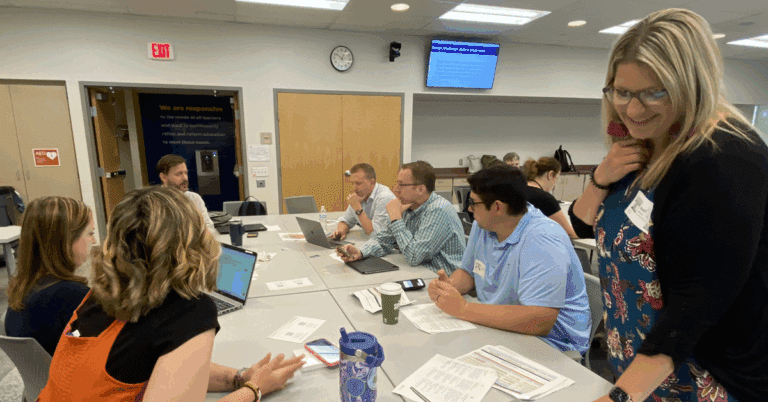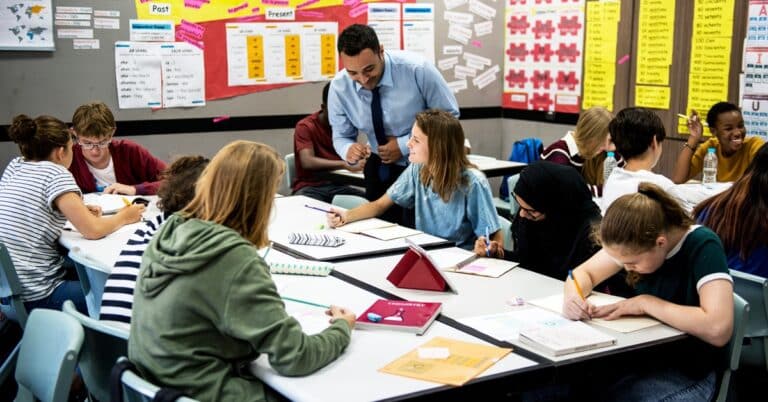Building support and engagement for any issue should always include opportunities to help others build a general understanding. The rise in social media has given a platform for grassroots issue-education to emerge, including voices traditionally underrepresented in traditional mediums. Platforms such as Twitter and Facebook especially allow for information (or misinformation) to spread quickly. However, if used well, social media can be a great tool to spread awareness and educate others about your education community’s values, vision, progress and successes. And it can be an effective amplifying tool for policy change.
You may use social media to organize others in your network to reach out to a policymaker, to share template scripts for a phone call or to celebrate the great work that’s happening in your learning community. Some social media platforms are better suited to certain kinds of communications than others, but each offers unique opportunities to elevate your message in support of personalized, competency-based learning not just to policymakers but between peers, as well.
By this time, social media is ubiquitous. And so the tips found below are designed to help you make the most of your time on platforms you already use to ensure your message is heard by the right folks. These tips can be used on any platform, but because many education leaders and policymakers are on Twitter, we have chosen to use that platform as our primary example.
Here are 6 things to consider when using social media to advocate:
1. Know your “Why.”
Understanding the reason for your individual or collective vision and resulting request for change is the most important part of establishing and growing a network of advocates and action, both online and in person. Knowing your “Why” can present more possibilities and better partnerships through more direct communication, expectations and strategies. Presenting your “why” concisely online is key to an impactful advocacy presence.
2. Understand your organization’s social media polices.
Do you know if your organization has a social media policy? If so, do you know what it is? It is often assumed that individuals are speaking for themselves, rather than for their organizations or school districts, but being aware of your organization or district’s social media policies ensures you are not misrepresenting yourself or others. Most social media policies simply ask that you state that opinions are your own.
Social media can be a great place to lend support for a unified vision with your peers. That said, it is also great way to join or foster community outside your organization too.
3. Hashtags are helpful.
Hashtags are a great way to develop a unified vision with a variety of voices. Develop, find and use relevant hashtags, including those any education leaders in your state’s schools may be using. Most often, the best way to find relevant hashtags is to find what education influencers use. For instance, the state’s department of education or a statewide education advocacy group may have already developed a hashtag you can also use. Arizona’s schools that have adopted personalized, competency-based learning methods have taken on the hashtag #AZResilient.
Using hashtags is an opportunity to join conversations already taking place online and deepen relationships with others in the field. Be sure to align your social media message with that of the hashtag you choose, or you run the risk of confusing policymakers. And don’t forget: If you can’t find a relevant tag, create your own! Additionally, please consider capitalizing words in the hashtag to separate them for ADA accessibility.
Potential hashtag templates and suggestions
- #Personalize(state abbreviation)
- #(state abbreviation)EdPolicy
- #(state abbreviation)Ed
- #(state abbreviation)Education
Real-world hashtag examples
- ND: #PersonalizeND
- SC: #PersonalizeSC
- MN: #EdMNVotes #RedForEd
- UT: UTEdChat
- OH: #EachChildOurFuture #MyOhioClassroom #OhioEd
- MI: #ProudMIEducator #MIEducation #MichED
4. Elevate your work, the work of fellow advocates and the work of policymakers.
Don’t be afraid to use social media to elevate the good work in your education community. This is a great way to provide positive feedback to policymakers—an opportunity to say thank you for making important votes—and to show what students in your school or district have been able to accomplish with the flexibilities granted through policy change. It’s also an opportunity to thank fellow advocates and community members, helping them see the fruits of their labor. Gratitude goes a long way and can help retain and strengthen positive relations with policymakers, their successors, fellow advocates and community members.
Education leaders in support of SB2196, which would give schools options to enable students to graduate through unconventional pathways, such as project-based learning and competency-based grading.@Supt_Jordan @Steinhoff81 @CorySteiner10 @aimeecopas @InnovatorPat pic.twitter.com/IBGCC4PrW6
— NDCEL (@NDCELorg) January 26, 2021
Held our first ever State of the District tonight. We are going to do this regularly so our stakeholders know who we are, what we are doing , and how we are doing it. Proud to have over 50 families join! @NCSD97 #ncgreatness #fierceNC pic.twitter.com/UCBpWU6tsk
— Cory Steiner (@CorySteiner10) January 22, 2021
Such an amazing week networking and solving problems of practice, while celebrating all the great things happening in my district @BBEschools @Design39Campus @knowledgeworks I enjoyed networking with our own computer scientist Annika as she worked with our Girls Can Code Club! pic.twitter.com/XxSnaQi8wK
— Miss Field (@MissField5) March 12, 2021
Creating authentic learning experiences is truly a passion of mine. Today we got to zoom with a musher who participated in the 2015 Iditarod. The kids were in awe! Thanks for connecting us @khanisch @The_Iditarod #fiercenc #personalizend @NCSD97 #authenticlearning pic.twitter.com/U84fPqGW6X
— Megan Margerum (@MeganMargerum) March 12, 2021
5. Don’t rely only on social media for advocacy.
Social media can play a role in spreading awareness of personalized, competency-based learning and perhaps garnering support. However, more likely than not, as an amplifier, it cannot create change on its own. Town hall meetings, calling your policymakers about upcoming bills, inviting policymakers to visit your school, and coordinating conversations with community stakeholders will enhance support for personalized, competency-based education and will in turn hopefully create new social media advocates.
6. Take courage.
Ignore the “trolls under the bridge” – people who intentionally provoke or upset others online – because what awaits you on the other side is bigger and better. It might sound silly, but there is a big difference between engaging with people who disagree with your stance and people who want to incite an argument. People will disagree with your stance and bots may pounce on any keyword that triggers them. Ignore any harassment, and be careful who you engage in debate.
Social Media Samples and Templates
Rallying others in school, school system or state for a campaign on issue:
Hi @(Educator) @(Parent) @(EducationPsychologist) would you like to help campaign for (issue)? I think this could be a great way to (reason). #EdPolicy #PersonalizeEd
Educator directly tweeting policymaker highlighting issue:
As a (role), I experience (issue) on a daily basis firsthand. (Action, like “Please vote [no/yes] on [bill name]” or “Can you help us make this happen for our children?”) #EdPolicy #PersonalizeEd
Educator retweeting article about education policy issue or personalized, competency-based learning:
Many educators conduct their classrooms in innovative ways, but sometimes education policy stands in the way of real change and real learning. What’s your view on seat time? https://knowledgeworks.org/resources/words-matter-utah-education-policy-future-learning/ (tag colleagues and policymakers) #EdPolicy #PersonalizeEd
Educator retweeting another state’s personalized learning success and calling attention to a policymaker:
Hi @(policymaker). Have you seen how SC supports districts in personalized, competency-based learning? Would you be interested in learning about how the state can support us? https://www.edsurge.com/news/2019-10-08-state-support-community-effort-personalized-learning-in-south-carolina #EdPolicy #PersonalizeEd
(Re)Tweeting article about why states are leaning into personalized, competency-based learning:
@(policymaker) States are seeing many values in updating our education system to be more equitable and prepare learners for success in whatever their future holds. Do you know what your educators and learners would like to see? https://www.pri.org/stories/2019-09-16/north-dakota-law-gives-school-districts-chance-experiment #EdPolicy #PersonalizeEd
Educator offering to help organize or contribute to education policy changes:
Hi, @(policymaker), I’d love to show you around our school and to meet with our educators and learners to see how (policy issue) effects them. #EdPolicy #PersonalizeEd
Educator thanking policymakers:
Thanks to @(policymaker) for listening and not just bringing new seats to the table but making an entirely new table. Our educators and learners are excited for the future of learning! #EdPolicy #PersonalizeEd #EdChat
Learn more about how to call your policymaker to advocate for personalized, competency-based learning.
This resource was co-written by former Director of State Advocacy Anne Olson.





